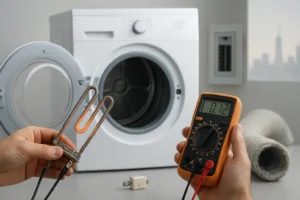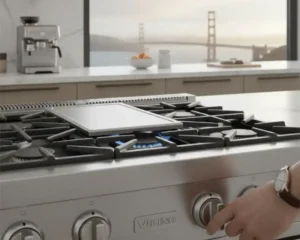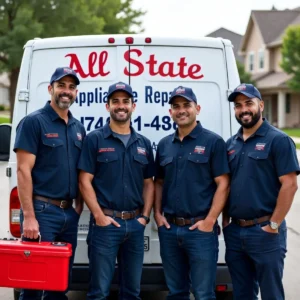Your home appliances work tirelessly to keep your household running smoothly, but without proper maintenance, these essential machines can break down unexpectedly and leave you with costly repair bills. For Burlingame homeowners, regular appliance maintenance isn’t just a recommendation—it’s a necessity that can save you thousands of dollars while ensuring your appliances operate at peak efficiency.
Professional appliance maintenance extends equipment lifespan by up to 50% and significantly reduces the likelihood of emergency breakdowns. Our certified technicians have compiled this comprehensive guide to help you maintain your most important household appliances, keeping them running efficiently for years to come.
Why Appliance Maintenance Matters for Burlingame Residents
Living in the Bay Area means dealing with unique environmental factors that can affect your appliances. The coastal climate, hard water, and frequent use patterns in busy households require proactive maintenance strategies. Regular upkeep prevents minor issues from becoming major problems, reduces energy consumption, and maintains manufacturer warranties.
Neglecting appliance maintenance can lead to:
- Premature equipment failure requiring expensive replacements
- Higher utility bills due to inefficient operation
- Food spoilage from refrigerator breakdowns
- Water damage from washing machine or dishwasher leaks
- Fire hazards from clogged dryer vents
Essential Refrigerator Maintenance Tips
Your refrigerator runs 24/7, making it one of the hardest-working appliances in your home. Proper maintenance ensures consistent temperatures, reduces energy consumption, and prevents food spoilage.
Clean Condenser Coils Every 6 Months
Dust and dirt on condenser coils can cause your refrigerator to overheat, forcing the compressor to work harder and increasing energy consumption. Located either behind or underneath your refrigerator, these coils require regular cleaning for optimal performance.
How to clean refrigerator coils:
- Unplug the refrigerator for safety
- Remove the front grille or access panel
- Use a coil brush or vacuum with brush attachment
- Gently remove dust and debris
- Replace the grille and plug back in
Replace Water Filters as Recommended
Most refrigerators with water dispensers or ice makers require filter replacement every 6 months. Old filters reduce water quality and can harbor bacteria, affecting both taste and health. Check your owner’s manual for specific replacement intervals and filter part numbers.
Maintain Optimal Temperature Settings
Keep your refrigerator between 37-40°F and your freezer at 0°F. Temperatures outside this range can cause food spoilage or force the appliance to work harder than necessary. Use an appliance thermometer to verify accuracy, as built-in displays aren’t always precise.
Inspect Door Seals Regularly
Damaged door seals allow cold air to escape, making your refrigerator work overtime. Test seals by closing the door on a dollar bill—if you can pull it out easily, the seal needs replacement. Clean seals monthly with warm, soapy water to prevent buildup that can cause damage.
Keep Interior Clean and Organized
The best way to maintain your refrigerator is simply to keep it clean, inside and out. Regular cleaning prevents odors and bacterial growth while helping you identify potential problems early. Remove expired items weekly and deep clean monthly with baking soda solution.
Washing Machine Care and Maintenance
Proper washing machine maintenance prevents costly repairs and ensures your clothes get properly clean. Modern machines require different care than older models, especially high-efficiency (HE) washers.
Run Monthly Cleaning Cycles
Clean your washing machine monthly with affresh® washing machine cleaning tablets to help remove buildup that can cause odor-causing residues. Even if your machine doesn’t have a dedicated cleaning cycle, run an empty hot water wash with specialized cleaning tablets or two cups of white vinegar.
Leave the Door Open After Use
Front-loading washers especially need air circulation to prevent mold and mildew growth. Leave the door and detergent dispenser open after each use to allow moisture to evaporate. This simple step prevents musty odors and extends your machine’s lifespan.
Inspect Hoses for Leaks and Wear
Check water supply hoses every six months for signs of cracking, bulging, or corrosion at connection points. Replace hoses every 5 years regardless of appearance, as internal deterioration isn’t always visible. Consider upgrading to braided stainless steel hoses for added durability.
Clean the Lint Filter Regularly
Top-loading machines have lint filters that require monthly cleaning. Remove and rinse under hot water, scrubbing gently with an old toothbrush to remove accumulated debris. A clogged filter reduces cleaning efficiency and can cause drainage problems.
Use Proper Detergent Amounts
Over-sudsing from excessive detergent creates residue buildup that can damage your machine and leave clothes dingy. HE washers require specially formulated low-sudsing detergents in smaller amounts than traditional machines. Follow manufacturer guidelines for optimal results.
Dryer Maintenance for Safety and Efficiency
Dryer maintenance is crucial for both efficiency and safety. Lint buildup is a leading cause of house fires, making regular cleaning essential for every household.
Clean the Lint Trap After Every Load
This is the most important dryer maintenance task. A clogged lint trap restricts airflow, making your dryer work harder and creating a fire hazard. Remove all visible lint by hand, then use a vacuum with brush attachment monthly to remove deeper debris.
Inspect and Clean External Vents Annually
When your dishwasher no longer cleans your dishes, a food-filled filter is most often to blame – and the same principle applies to dryers with lint-filled vents. Check your exterior vent hood quarterly to ensure the flap opens freely and airflow isn’t restricted. Annual professional cleaning removes lint from the entire duct system.
Check Exhaust Hoses for Blockages
Flexible exhaust hoses can accumulate lint and become compressed, restricting airflow. Inspect the hose connection twice yearly, looking for kinks, compression, or lint buildup. Replace damaged hoses immediately with rigid or semi-rigid metal ducting when possible.
Avoid Overloading the Machine
Overloading prevents proper air circulation and extends drying times, wasting energy and creating excessive wear. Follow manufacturer guidelines for load capacity, typically filling the drum no more than 2/3 full for optimal performance.
Schedule Professional Cleaning Yearly
Professional dryer vent cleaning removes lint from areas you can’t reach, reducing fire risk and improving efficiency. Clothes taking longer to dry or unusual burning smells indicate the need for immediate professional service.
Dishwasher Maintenance Tips
A well-maintained dishwasher provides spotless dishes while operating efficiently. Regular care prevents clogs, reduces odors, and extends equipment life.
Scrape Dishes But Don’t Pre-Rinse
Modern dishwashers are designed to handle food particles, and pre-rinsing can actually reduce cleaning effectiveness. Simply scrape off large food pieces and let your dishwasher do the work. Over-rinsing removes enzymes that detergents need to break down food residue.
Run Hot Water Before Starting
Start hot water at your kitchen sink until it’s steaming before starting your dishwasher. This ensures the machine begins with hot water for optimal cleaning performance. Water temperature should reach 120°F for best results.
Clean the Filter Monthly
Locate and remove the dishwasher filter from the bottom of the dishwasher — many unlock from their spot by turning them. Rinse loose debris and scrub with soap and hot water. A clean filter prevents food particles from redepositing on dishes and reduces odors.
Inspect Spray Arms for Clogs
Remove spray arms monthly and rinse under hot water, using a toothpick to clear holes blocked by food particles or mineral deposits. The spinning or spray arms aid in the cleaning of dishes by spraying hot water to clean dishes, so keeping them clear is essential for proper operation.
Use Rinse Aid for Better Drying
Rinse aid helps water sheet off dishes instead of forming droplets, improving drying performance and preventing water spots. Refill the rinse aid dispenser monthly or when the indicator light appears. Adjust the setting based on your water hardness level.
Clean Door Seals and Gaskets
Dishwashers have seals around the door rim to prevent the machine from leaking while running. Wipe down rubber seals monthly with a damp cloth and mild detergent to prevent soil buildup and maintain a proper seal.
Oven and Range Care
Your oven and range require regular maintenance to ensure safe operation and consistent cooking results. Proper care prevents dangerous gas leaks and maintains temperature accuracy.
Clean Spills Immediately When Cool
Address spills as soon as the surface cools to prevent baked-on residue that’s difficult to remove. For the oven interior, use the self-cleaning cycle sparingly—excessive use can damage electronic components. Instead, clean regularly with mild oven cleaners.
Check and Replace Worn Door Seals
Oven door seals maintain proper cooking temperatures and prevent heat loss. Inspect seals for tears, cracks, or areas where the seal doesn’t make full contact with the door frame. Replace damaged seals promptly to maintain efficiency and cooking performance.
Calibrate Temperature Annually
Oven temperatures can drift over time, affecting cooking results. Use an oven thermometer to verify accuracy and have a professional calibrate the temperature if readings are off by more than 25°F. This ensures consistent baking and roasting results.
Clean Burner Grates and Drip Pans
For gas ranges, remove and wash burner grates and drip pans regularly to prevent grease buildup that can cause flare-ups. Soak in hot, soapy water and scrub with non-abrasive cleaners. Keep burner ports clear of food debris for proper flame distribution.
Schedule Professional Maintenance
To maintain your range, our technicians check that the gas connections are secure, electrical components function properly, and safety systems operate correctly. Annual professional service identifies potential problems before they become dangerous or expensive to repair.
When to Call Professional Appliance Repair Services
While regular maintenance prevents many problems, some issues require professional expertise. Here are some signs your appliance might need expert attention: Refrigerator: Inconsistent cooling or loud noises. Dryer: Clothes taking longer to dry or unusual burning smells. Dishwasher: Persistent leaks or failure to drain.
Additional warning signs include:
- Unusual noises, vibrations, or odors
- Visible damage to electrical components
- Water leaks or moisture where it shouldn’t be
- Appliances not starting or cycling properly
- Error codes or warning lights
Cost-Effective Maintenance Schedule
Creating a maintenance schedule helps ensure you don’t miss important tasks:
Monthly Tasks:
- Clean lint trap and inspect dryer vent
- Run washing machine cleaning cycle
- Clean dishwasher filter
- Check refrigerator temperature and clean interior
Quarterly Tasks:
- Inspect appliance hoses and connections
- Clean refrigerator coils
- Test refrigerator door seals
- Check exterior dryer vent
Annually:
- Professional dryer vent cleaning
- Oven temperature calibration
- Professional appliance inspection
- Replace water filters as needed
Conclusion: Protecting Your Investment
Regular appliance maintenance protects your significant investment while ensuring reliable operation when you need it most. By following these expert tips from our certified technicians, Burlingame homeowners can avoid costly emergency repairs and extend appliance life substantially.
Remember that while DIY maintenance handles routine care, complex issues require professional expertise. Don’t hesitate to contact experienced appliance repair professionals when you notice warning signs or need assistance with maintenance tasks.
Your appliances are essential to your daily routine—give them the care they deserve, and they’ll serve you reliably for years to come. Start implementing these maintenance tips today, and you’ll enjoy the peace of mind that comes with well-maintained appliances and the cost savings of avoiding premature replacements.
For professional appliance maintenance and repair services in Burlingame, contact our certified technicians who understand the unique needs of Bay Area homes and can keep your appliances running at peak performance.






